Evaluating Staff Training on Patient Service Quality at NMC Hospital
VerifiedAdded on 2020/10/05
|60
|20241
|178
Report
AI Summary
This dissertation explores the effect of regular staff training on the quality of patient services, using NMC Hospital as a case study. The research employs a qualitative, exploratory design, utilizing both primary and secondary data, with a sample population selected via simple random sampling. The study's introduction provides an overview of the research, the organization, and the rationale behind the investigation, emphasizing the significance of staff training in enhancing patient care. A comprehensive literature review examines the concept of staff training, areas within NMC Hospital needing improvement, and ways to improve service quality. The methodology section details the research type, design, approach, and philosophy, along with the sampling strategy. The data analysis includes statistical and thematic analysis, with considerations for ethical practices like informed consent and confidentiality. The results section presents the thematic analysis and potential limitations, followed by conclusions and recommendations for future research. The findings highlight the positive impact of training provisions on healthcare professionals' ability to assess patients' needs, ultimately improving service quality and patient outcomes. The research emphasizes the importance of a structured training framework for healthcare staff to enhance patient care quality.

Module Name: Dissertation
1
1
Paraphrase This Document
Need a fresh take? Get an instant paraphrase of this document with our AI Paraphraser
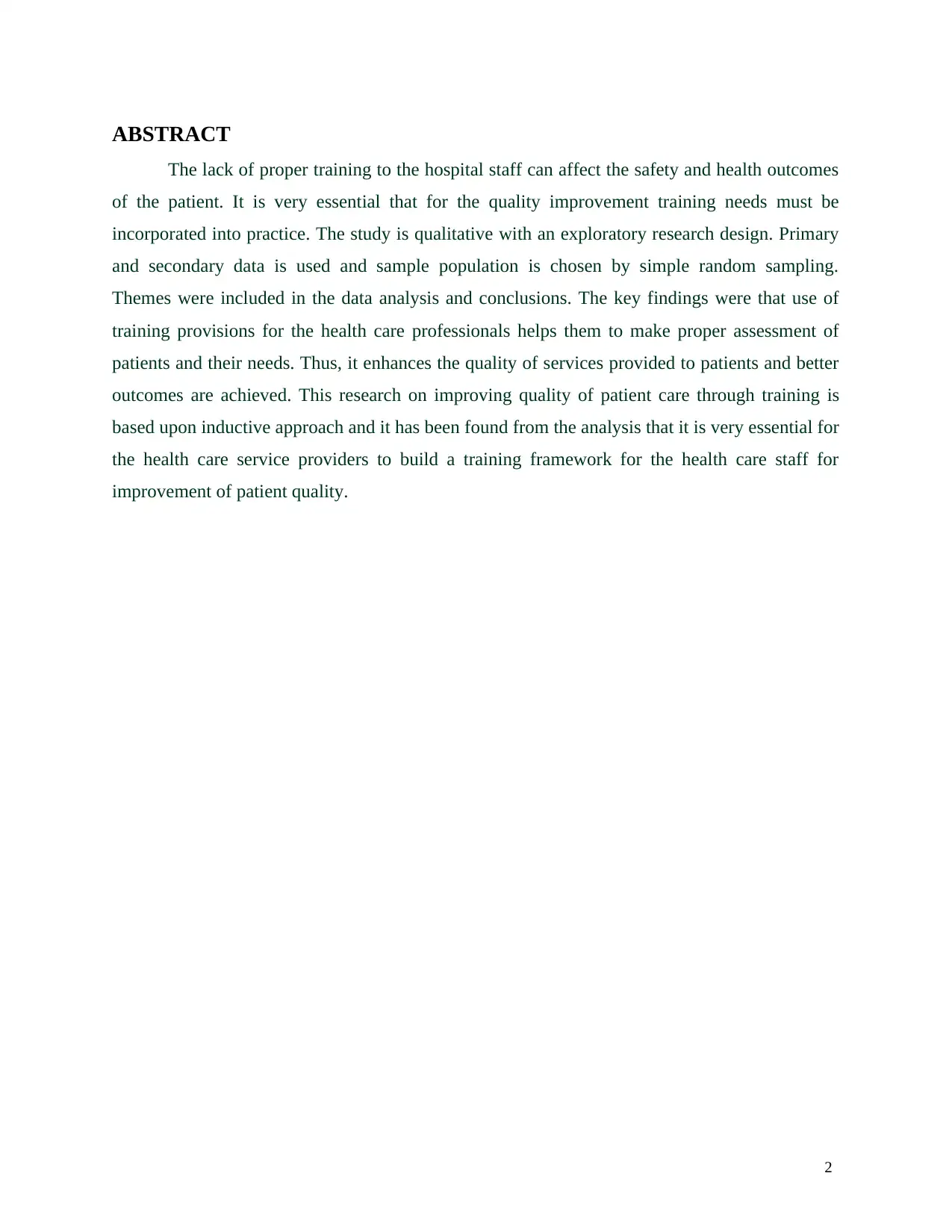
ABSTRACT
The lack of proper training to the hospital staff can affect the safety and health outcomes
of the patient. It is very essential that for the quality improvement training needs must be
incorporated into practice. The study is qualitative with an exploratory research design. Primary
and secondary data is used and sample population is chosen by simple random sampling.
Themes were included in the data analysis and conclusions. The key findings were that use of
training provisions for the health care professionals helps them to make proper assessment of
patients and their needs. Thus, it enhances the quality of services provided to patients and better
outcomes are achieved. This research on improving quality of patient care through training is
based upon inductive approach and it has been found from the analysis that it is very essential for
the health care service providers to build a training framework for the health care staff for
improvement of patient quality.
2
The lack of proper training to the hospital staff can affect the safety and health outcomes
of the patient. It is very essential that for the quality improvement training needs must be
incorporated into practice. The study is qualitative with an exploratory research design. Primary
and secondary data is used and sample population is chosen by simple random sampling.
Themes were included in the data analysis and conclusions. The key findings were that use of
training provisions for the health care professionals helps them to make proper assessment of
patients and their needs. Thus, it enhances the quality of services provided to patients and better
outcomes are achieved. This research on improving quality of patient care through training is
based upon inductive approach and it has been found from the analysis that it is very essential for
the health care service providers to build a training framework for the health care staff for
improvement of patient quality.
2
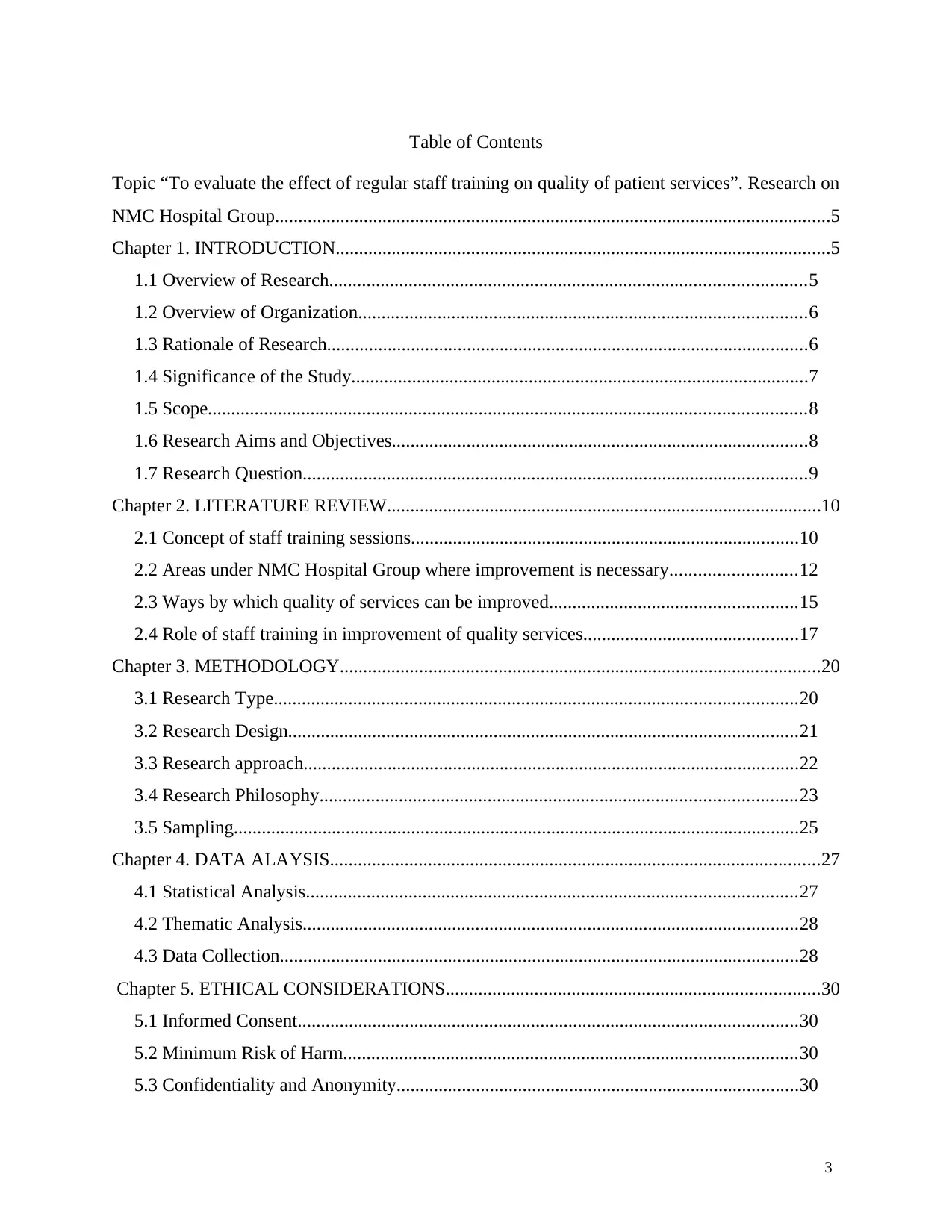
Table of Contents
Topic “To evaluate the effect of regular staff training on quality of patient services”. Research on
NMC Hospital Group.......................................................................................................................5
Chapter 1. INTRODUCTION..........................................................................................................5
1.1 Overview of Research......................................................................................................5
1.2 Overview of Organization................................................................................................6
1.3 Rationale of Research.......................................................................................................6
1.4 Significance of the Study..................................................................................................7
1.5 Scope................................................................................................................................8
1.6 Research Aims and Objectives.........................................................................................8
1.7 Research Question............................................................................................................9
Chapter 2. LITERATURE REVIEW.............................................................................................10
2.1 Concept of staff training sessions...................................................................................10
2.2 Areas under NMC Hospital Group where improvement is necessary...........................12
2.3 Ways by which quality of services can be improved.....................................................15
2.4 Role of staff training in improvement of quality services..............................................17
Chapter 3. METHODOLOGY.......................................................................................................20
3.1 Research Type................................................................................................................20
3.2 Research Design.............................................................................................................21
3.3 Research approach..........................................................................................................22
3.4 Research Philosophy......................................................................................................23
3.5 Sampling.........................................................................................................................25
Chapter 4. DATA ALAYSIS.........................................................................................................27
4.1 Statistical Analysis.........................................................................................................27
4.2 Thematic Analysis..........................................................................................................28
4.3 Data Collection...............................................................................................................28
Chapter 5. ETHICAL CONSIDERATIONS................................................................................30
5.1 Informed Consent...........................................................................................................30
5.2 Minimum Risk of Harm.................................................................................................30
5.3 Confidentiality and Anonymity......................................................................................30
3
Topic “To evaluate the effect of regular staff training on quality of patient services”. Research on
NMC Hospital Group.......................................................................................................................5
Chapter 1. INTRODUCTION..........................................................................................................5
1.1 Overview of Research......................................................................................................5
1.2 Overview of Organization................................................................................................6
1.3 Rationale of Research.......................................................................................................6
1.4 Significance of the Study..................................................................................................7
1.5 Scope................................................................................................................................8
1.6 Research Aims and Objectives.........................................................................................8
1.7 Research Question............................................................................................................9
Chapter 2. LITERATURE REVIEW.............................................................................................10
2.1 Concept of staff training sessions...................................................................................10
2.2 Areas under NMC Hospital Group where improvement is necessary...........................12
2.3 Ways by which quality of services can be improved.....................................................15
2.4 Role of staff training in improvement of quality services..............................................17
Chapter 3. METHODOLOGY.......................................................................................................20
3.1 Research Type................................................................................................................20
3.2 Research Design.............................................................................................................21
3.3 Research approach..........................................................................................................22
3.4 Research Philosophy......................................................................................................23
3.5 Sampling.........................................................................................................................25
Chapter 4. DATA ALAYSIS.........................................................................................................27
4.1 Statistical Analysis.........................................................................................................27
4.2 Thematic Analysis..........................................................................................................28
4.3 Data Collection...............................................................................................................28
Chapter 5. ETHICAL CONSIDERATIONS................................................................................30
5.1 Informed Consent...........................................................................................................30
5.2 Minimum Risk of Harm.................................................................................................30
5.3 Confidentiality and Anonymity......................................................................................30
3
⊘ This is a preview!⊘
Do you want full access?
Subscribe today to unlock all pages.

Trusted by 1+ million students worldwide
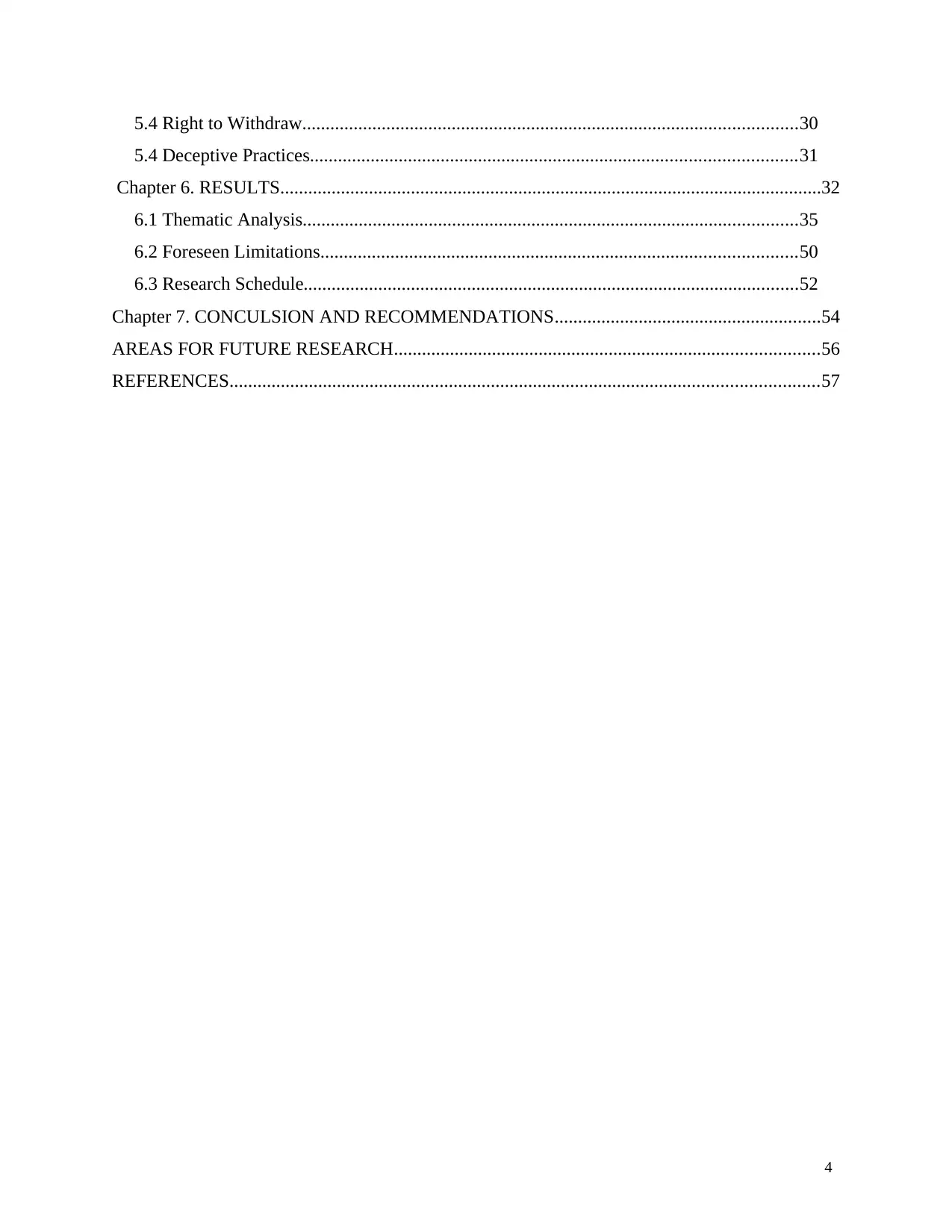
5.4 Right to Withdraw..........................................................................................................30
5.4 Deceptive Practices........................................................................................................31
Chapter 6. RESULTS....................................................................................................................32
6.1 Thematic Analysis..........................................................................................................35
6.2 Foreseen Limitations......................................................................................................50
6.3 Research Schedule..........................................................................................................52
Chapter 7. CONCULSION AND RECOMMENDATIONS.........................................................54
AREAS FOR FUTURE RESEARCH...........................................................................................56
REFERENCES..............................................................................................................................57
4
5.4 Deceptive Practices........................................................................................................31
Chapter 6. RESULTS....................................................................................................................32
6.1 Thematic Analysis..........................................................................................................35
6.2 Foreseen Limitations......................................................................................................50
6.3 Research Schedule..........................................................................................................52
Chapter 7. CONCULSION AND RECOMMENDATIONS.........................................................54
AREAS FOR FUTURE RESEARCH...........................................................................................56
REFERENCES..............................................................................................................................57
4
Paraphrase This Document
Need a fresh take? Get an instant paraphrase of this document with our AI Paraphraser
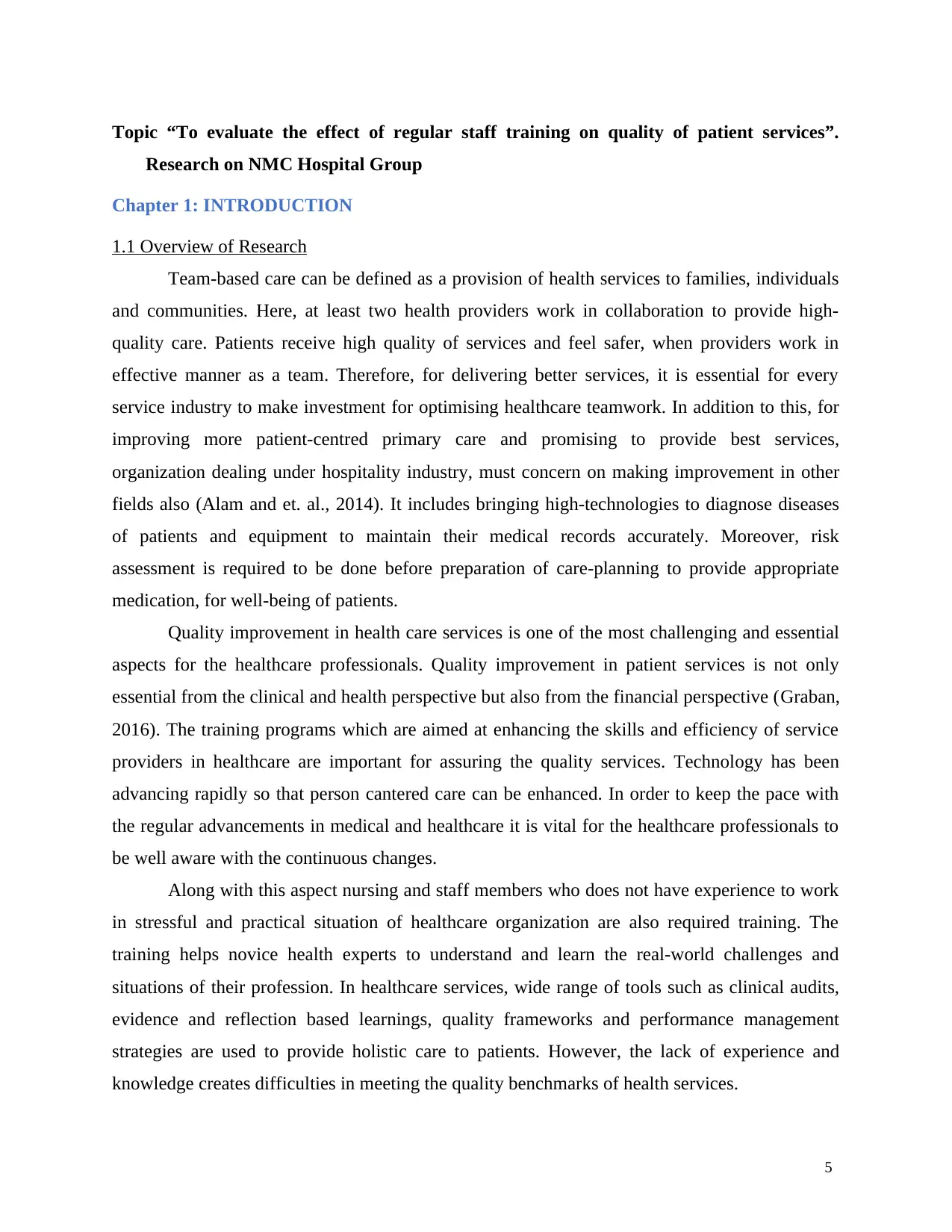
Topic “To evaluate the effect of regular staff training on quality of patient services”.
Research on NMC Hospital Group
Chapter 1: INTRODUCTION
1.1 Overview of Research
Team-based care can be defined as a provision of health services to families, individuals
and communities. Here, at least two health providers work in collaboration to provide high-
quality care. Patients receive high quality of services and feel safer, when providers work in
effective manner as a team. Therefore, for delivering better services, it is essential for every
service industry to make investment for optimising healthcare teamwork. In addition to this, for
improving more patient-centred primary care and promising to provide best services,
organization dealing under hospitality industry, must concern on making improvement in other
fields also (Alam and et. al., 2014). It includes bringing high-technologies to diagnose diseases
of patients and equipment to maintain their medical records accurately. Moreover, risk
assessment is required to be done before preparation of care-planning to provide appropriate
medication, for well-being of patients.
Quality improvement in health care services is one of the most challenging and essential
aspects for the healthcare professionals. Quality improvement in patient services is not only
essential from the clinical and health perspective but also from the financial perspective (Graban,
2016). The training programs which are aimed at enhancing the skills and efficiency of service
providers in healthcare are important for assuring the quality services. Technology has been
advancing rapidly so that person cantered care can be enhanced. In order to keep the pace with
the regular advancements in medical and healthcare it is vital for the healthcare professionals to
be well aware with the continuous changes.
Along with this aspect nursing and staff members who does not have experience to work
in stressful and practical situation of healthcare organization are also required training. The
training helps novice health experts to understand and learn the real-world challenges and
situations of their profession. In healthcare services, wide range of tools such as clinical audits,
evidence and reflection based learnings, quality frameworks and performance management
strategies are used to provide holistic care to patients. However, the lack of experience and
knowledge creates difficulties in meeting the quality benchmarks of health services.
5
Research on NMC Hospital Group
Chapter 1: INTRODUCTION
1.1 Overview of Research
Team-based care can be defined as a provision of health services to families, individuals
and communities. Here, at least two health providers work in collaboration to provide high-
quality care. Patients receive high quality of services and feel safer, when providers work in
effective manner as a team. Therefore, for delivering better services, it is essential for every
service industry to make investment for optimising healthcare teamwork. In addition to this, for
improving more patient-centred primary care and promising to provide best services,
organization dealing under hospitality industry, must concern on making improvement in other
fields also (Alam and et. al., 2014). It includes bringing high-technologies to diagnose diseases
of patients and equipment to maintain their medical records accurately. Moreover, risk
assessment is required to be done before preparation of care-planning to provide appropriate
medication, for well-being of patients.
Quality improvement in health care services is one of the most challenging and essential
aspects for the healthcare professionals. Quality improvement in patient services is not only
essential from the clinical and health perspective but also from the financial perspective (Graban,
2016). The training programs which are aimed at enhancing the skills and efficiency of service
providers in healthcare are important for assuring the quality services. Technology has been
advancing rapidly so that person cantered care can be enhanced. In order to keep the pace with
the regular advancements in medical and healthcare it is vital for the healthcare professionals to
be well aware with the continuous changes.
Along with this aspect nursing and staff members who does not have experience to work
in stressful and practical situation of healthcare organization are also required training. The
training helps novice health experts to understand and learn the real-world challenges and
situations of their profession. In healthcare services, wide range of tools such as clinical audits,
evidence and reflection based learnings, quality frameworks and performance management
strategies are used to provide holistic care to patients. However, the lack of experience and
knowledge creates difficulties in meeting the quality benchmarks of health services.
5
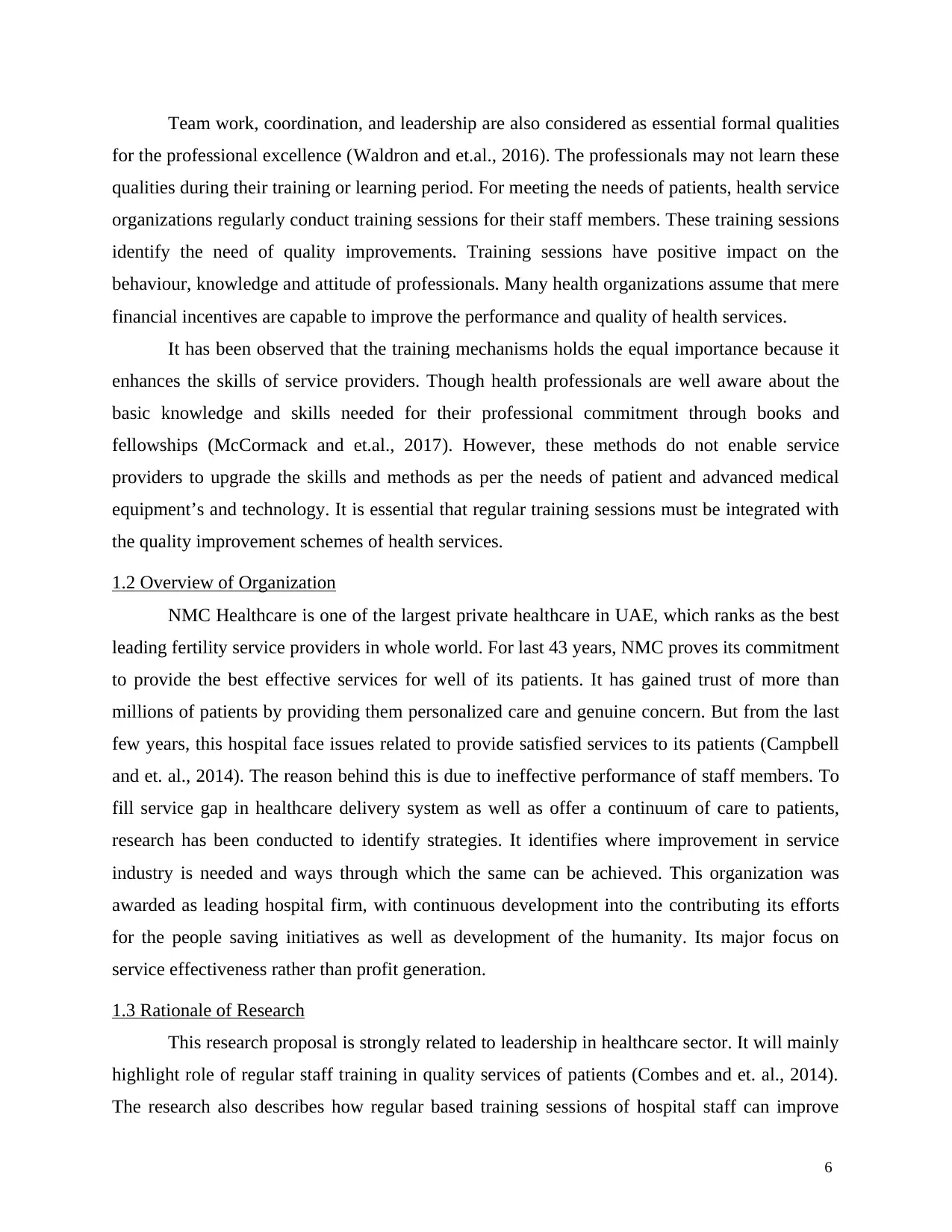
Team work, coordination, and leadership are also considered as essential formal qualities
for the professional excellence (Waldron and et.al., 2016). The professionals may not learn these
qualities during their training or learning period. For meeting the needs of patients, health service
organizations regularly conduct training sessions for their staff members. These training sessions
identify the need of quality improvements. Training sessions have positive impact on the
behaviour, knowledge and attitude of professionals. Many health organizations assume that mere
financial incentives are capable to improve the performance and quality of health services.
It has been observed that the training mechanisms holds the equal importance because it
enhances the skills of service providers. Though health professionals are well aware about the
basic knowledge and skills needed for their professional commitment through books and
fellowships (McCormack and et.al., 2017). However, these methods do not enable service
providers to upgrade the skills and methods as per the needs of patient and advanced medical
equipment’s and technology. It is essential that regular training sessions must be integrated with
the quality improvement schemes of health services.
1.2 Overview of Organization
NMC Healthcare is one of the largest private healthcare in UAE, which ranks as the best
leading fertility service providers in whole world. For last 43 years, NMC proves its commitment
to provide the best effective services for well of its patients. It has gained trust of more than
millions of patients by providing them personalized care and genuine concern. But from the last
few years, this hospital face issues related to provide satisfied services to its patients (Campbell
and et. al., 2014). The reason behind this is due to ineffective performance of staff members. To
fill service gap in healthcare delivery system as well as offer a continuum of care to patients,
research has been conducted to identify strategies. It identifies where improvement in service
industry is needed and ways through which the same can be achieved. This organization was
awarded as leading hospital firm, with continuous development into the contributing its efforts
for the people saving initiatives as well as development of the humanity. Its major focus on
service effectiveness rather than profit generation.
1.3 Rationale of Research
This research proposal is strongly related to leadership in healthcare sector. It will mainly
highlight role of regular staff training in quality services of patients (Combes and et. al., 2014).
The research also describes how regular based training sessions of hospital staff can improve
6
for the professional excellence (Waldron and et.al., 2016). The professionals may not learn these
qualities during their training or learning period. For meeting the needs of patients, health service
organizations regularly conduct training sessions for their staff members. These training sessions
identify the need of quality improvements. Training sessions have positive impact on the
behaviour, knowledge and attitude of professionals. Many health organizations assume that mere
financial incentives are capable to improve the performance and quality of health services.
It has been observed that the training mechanisms holds the equal importance because it
enhances the skills of service providers. Though health professionals are well aware about the
basic knowledge and skills needed for their professional commitment through books and
fellowships (McCormack and et.al., 2017). However, these methods do not enable service
providers to upgrade the skills and methods as per the needs of patient and advanced medical
equipment’s and technology. It is essential that regular training sessions must be integrated with
the quality improvement schemes of health services.
1.2 Overview of Organization
NMC Healthcare is one of the largest private healthcare in UAE, which ranks as the best
leading fertility service providers in whole world. For last 43 years, NMC proves its commitment
to provide the best effective services for well of its patients. It has gained trust of more than
millions of patients by providing them personalized care and genuine concern. But from the last
few years, this hospital face issues related to provide satisfied services to its patients (Campbell
and et. al., 2014). The reason behind this is due to ineffective performance of staff members. To
fill service gap in healthcare delivery system as well as offer a continuum of care to patients,
research has been conducted to identify strategies. It identifies where improvement in service
industry is needed and ways through which the same can be achieved. This organization was
awarded as leading hospital firm, with continuous development into the contributing its efforts
for the people saving initiatives as well as development of the humanity. Its major focus on
service effectiveness rather than profit generation.
1.3 Rationale of Research
This research proposal is strongly related to leadership in healthcare sector. It will mainly
highlight role of regular staff training in quality services of patients (Combes and et. al., 2014).
The research also describes how regular based training sessions of hospital staff can improve
6
⊘ This is a preview!⊘
Do you want full access?
Subscribe today to unlock all pages.

Trusted by 1+ million students worldwide
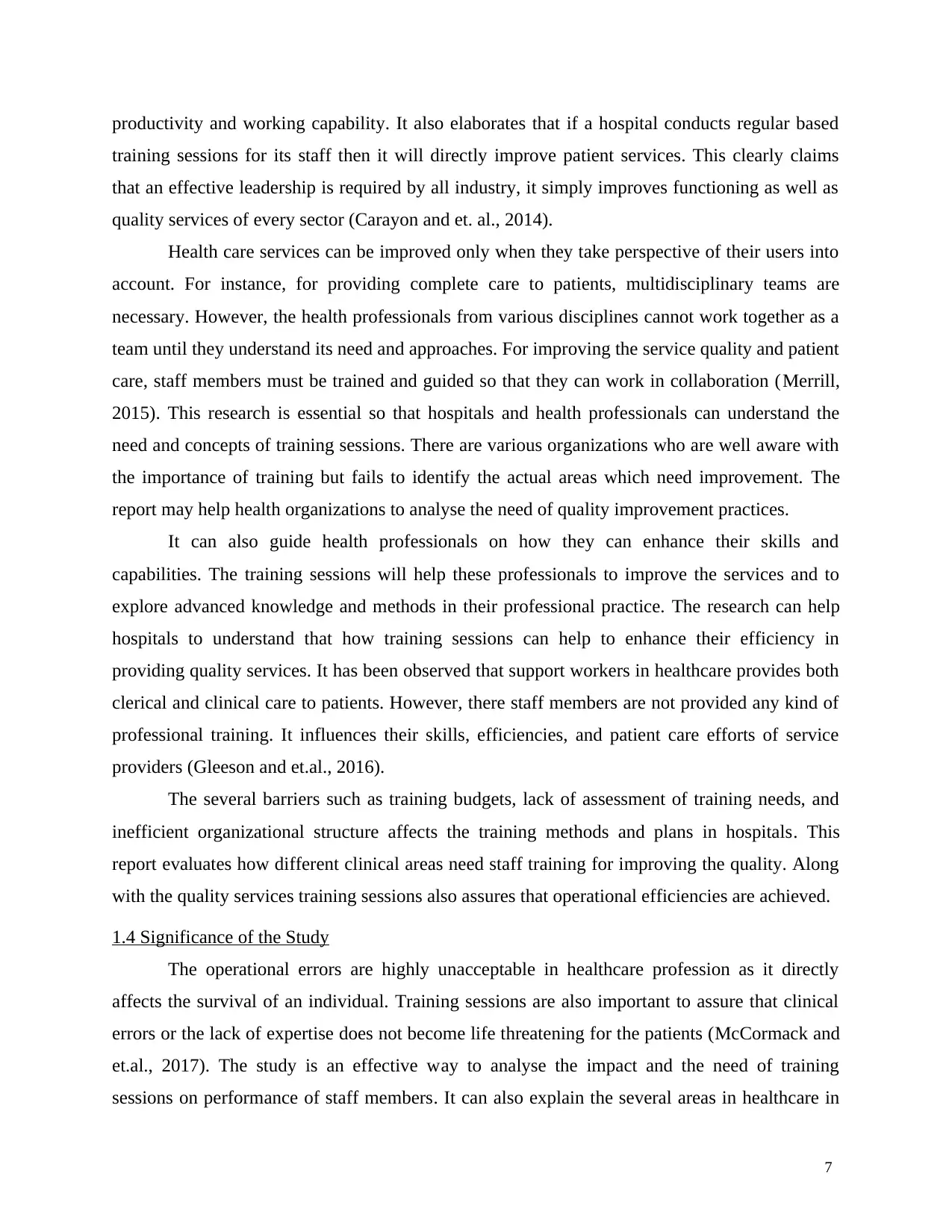
productivity and working capability. It also elaborates that if a hospital conducts regular based
training sessions for its staff then it will directly improve patient services. This clearly claims
that an effective leadership is required by all industry, it simply improves functioning as well as
quality services of every sector (Carayon and et. al., 2014).
Health care services can be improved only when they take perspective of their users into
account. For instance, for providing complete care to patients, multidisciplinary teams are
necessary. However, the health professionals from various disciplines cannot work together as a
team until they understand its need and approaches. For improving the service quality and patient
care, staff members must be trained and guided so that they can work in collaboration (Merrill,
2015). This research is essential so that hospitals and health professionals can understand the
need and concepts of training sessions. There are various organizations who are well aware with
the importance of training but fails to identify the actual areas which need improvement. The
report may help health organizations to analyse the need of quality improvement practices.
It can also guide health professionals on how they can enhance their skills and
capabilities. The training sessions will help these professionals to improve the services and to
explore advanced knowledge and methods in their professional practice. The research can help
hospitals to understand that how training sessions can help to enhance their efficiency in
providing quality services. It has been observed that support workers in healthcare provides both
clerical and clinical care to patients. However, there staff members are not provided any kind of
professional training. It influences their skills, efficiencies, and patient care efforts of service
providers (Gleeson and et.al., 2016).
The several barriers such as training budgets, lack of assessment of training needs, and
inefficient organizational structure affects the training methods and plans in hospitals. This
report evaluates how different clinical areas need staff training for improving the quality. Along
with the quality services training sessions also assures that operational efficiencies are achieved.
1.4 Significance of the Study
The operational errors are highly unacceptable in healthcare profession as it directly
affects the survival of an individual. Training sessions are also important to assure that clinical
errors or the lack of expertise does not become life threatening for the patients (McCormack and
et.al., 2017). The study is an effective way to analyse the impact and the need of training
sessions on performance of staff members. It can also explain the several areas in healthcare in
7
training sessions for its staff then it will directly improve patient services. This clearly claims
that an effective leadership is required by all industry, it simply improves functioning as well as
quality services of every sector (Carayon and et. al., 2014).
Health care services can be improved only when they take perspective of their users into
account. For instance, for providing complete care to patients, multidisciplinary teams are
necessary. However, the health professionals from various disciplines cannot work together as a
team until they understand its need and approaches. For improving the service quality and patient
care, staff members must be trained and guided so that they can work in collaboration (Merrill,
2015). This research is essential so that hospitals and health professionals can understand the
need and concepts of training sessions. There are various organizations who are well aware with
the importance of training but fails to identify the actual areas which need improvement. The
report may help health organizations to analyse the need of quality improvement practices.
It can also guide health professionals on how they can enhance their skills and
capabilities. The training sessions will help these professionals to improve the services and to
explore advanced knowledge and methods in their professional practice. The research can help
hospitals to understand that how training sessions can help to enhance their efficiency in
providing quality services. It has been observed that support workers in healthcare provides both
clerical and clinical care to patients. However, there staff members are not provided any kind of
professional training. It influences their skills, efficiencies, and patient care efforts of service
providers (Gleeson and et.al., 2016).
The several barriers such as training budgets, lack of assessment of training needs, and
inefficient organizational structure affects the training methods and plans in hospitals. This
report evaluates how different clinical areas need staff training for improving the quality. Along
with the quality services training sessions also assures that operational efficiencies are achieved.
1.4 Significance of the Study
The operational errors are highly unacceptable in healthcare profession as it directly
affects the survival of an individual. Training sessions are also important to assure that clinical
errors or the lack of expertise does not become life threatening for the patients (McCormack and
et.al., 2017). The study is an effective way to analyse the impact and the need of training
sessions on performance of staff members. It can also explain the several areas in healthcare in
7
Paraphrase This Document
Need a fresh take? Get an instant paraphrase of this document with our AI Paraphraser
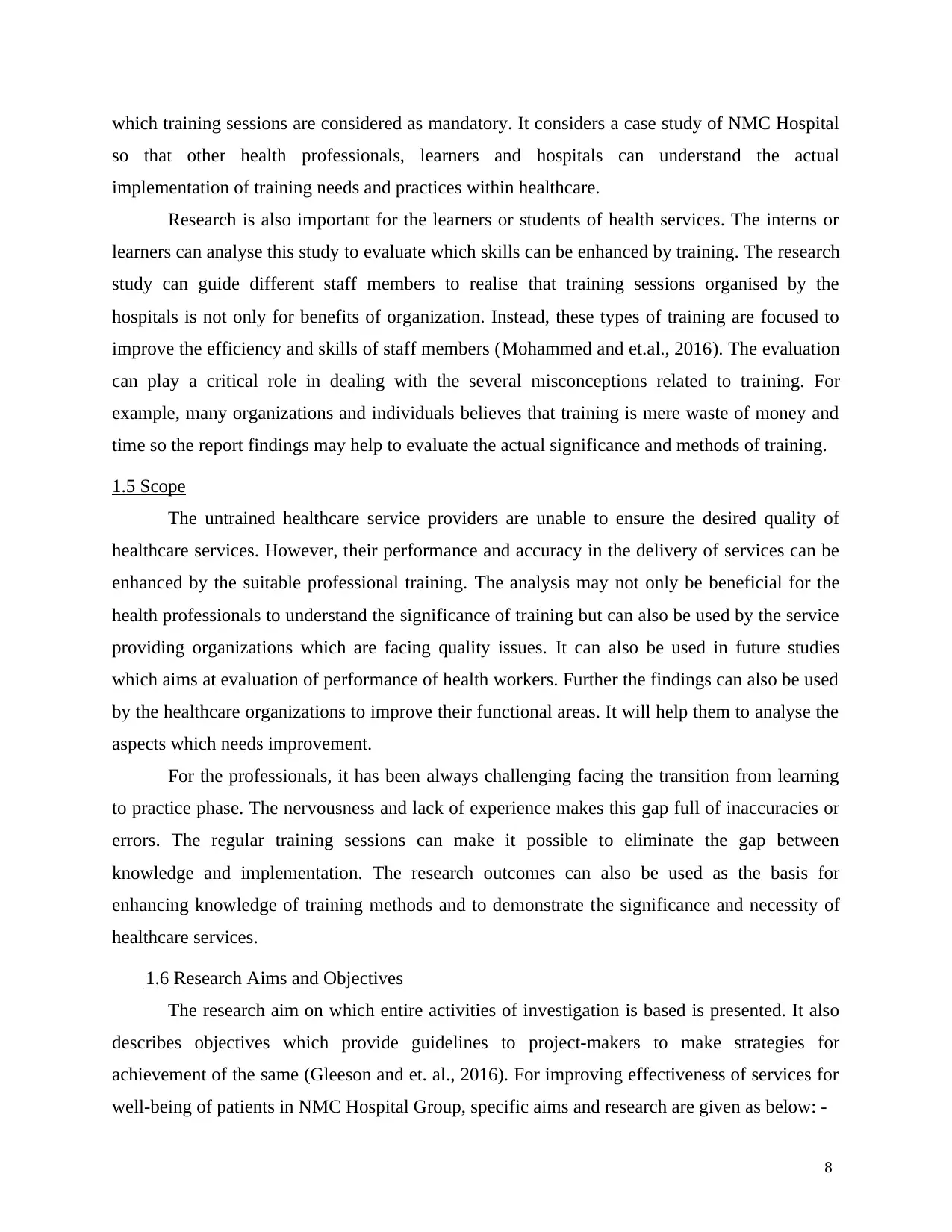
which training sessions are considered as mandatory. It considers a case study of NMC Hospital
so that other health professionals, learners and hospitals can understand the actual
implementation of training needs and practices within healthcare.
Research is also important for the learners or students of health services. The interns or
learners can analyse this study to evaluate which skills can be enhanced by training. The research
study can guide different staff members to realise that training sessions organised by the
hospitals is not only for benefits of organization. Instead, these types of training are focused to
improve the efficiency and skills of staff members (Mohammed and et.al., 2016). The evaluation
can play a critical role in dealing with the several misconceptions related to training. For
example, many organizations and individuals believes that training is mere waste of money and
time so the report findings may help to evaluate the actual significance and methods of training.
1.5 Scope
The untrained healthcare service providers are unable to ensure the desired quality of
healthcare services. However, their performance and accuracy in the delivery of services can be
enhanced by the suitable professional training. The analysis may not only be beneficial for the
health professionals to understand the significance of training but can also be used by the service
providing organizations which are facing quality issues. It can also be used in future studies
which aims at evaluation of performance of health workers. Further the findings can also be used
by the healthcare organizations to improve their functional areas. It will help them to analyse the
aspects which needs improvement.
For the professionals, it has been always challenging facing the transition from learning
to practice phase. The nervousness and lack of experience makes this gap full of inaccuracies or
errors. The regular training sessions can make it possible to eliminate the gap between
knowledge and implementation. The research outcomes can also be used as the basis for
enhancing knowledge of training methods and to demonstrate the significance and necessity of
healthcare services.
1.6 Research Aims and Objectives
The research aim on which entire activities of investigation is based is presented. It also
describes objectives which provide guidelines to project-makers to make strategies for
achievement of the same (Gleeson and et. al., 2016). For improving effectiveness of services for
well-being of patients in NMC Hospital Group, specific aims and research are given as below: -
8
so that other health professionals, learners and hospitals can understand the actual
implementation of training needs and practices within healthcare.
Research is also important for the learners or students of health services. The interns or
learners can analyse this study to evaluate which skills can be enhanced by training. The research
study can guide different staff members to realise that training sessions organised by the
hospitals is not only for benefits of organization. Instead, these types of training are focused to
improve the efficiency and skills of staff members (Mohammed and et.al., 2016). The evaluation
can play a critical role in dealing with the several misconceptions related to training. For
example, many organizations and individuals believes that training is mere waste of money and
time so the report findings may help to evaluate the actual significance and methods of training.
1.5 Scope
The untrained healthcare service providers are unable to ensure the desired quality of
healthcare services. However, their performance and accuracy in the delivery of services can be
enhanced by the suitable professional training. The analysis may not only be beneficial for the
health professionals to understand the significance of training but can also be used by the service
providing organizations which are facing quality issues. It can also be used in future studies
which aims at evaluation of performance of health workers. Further the findings can also be used
by the healthcare organizations to improve their functional areas. It will help them to analyse the
aspects which needs improvement.
For the professionals, it has been always challenging facing the transition from learning
to practice phase. The nervousness and lack of experience makes this gap full of inaccuracies or
errors. The regular training sessions can make it possible to eliminate the gap between
knowledge and implementation. The research outcomes can also be used as the basis for
enhancing knowledge of training methods and to demonstrate the significance and necessity of
healthcare services.
1.6 Research Aims and Objectives
The research aim on which entire activities of investigation is based is presented. It also
describes objectives which provide guidelines to project-makers to make strategies for
achievement of the same (Gleeson and et. al., 2016). For improving effectiveness of services for
well-being of patients in NMC Hospital Group, specific aims and research are given as below: -
8
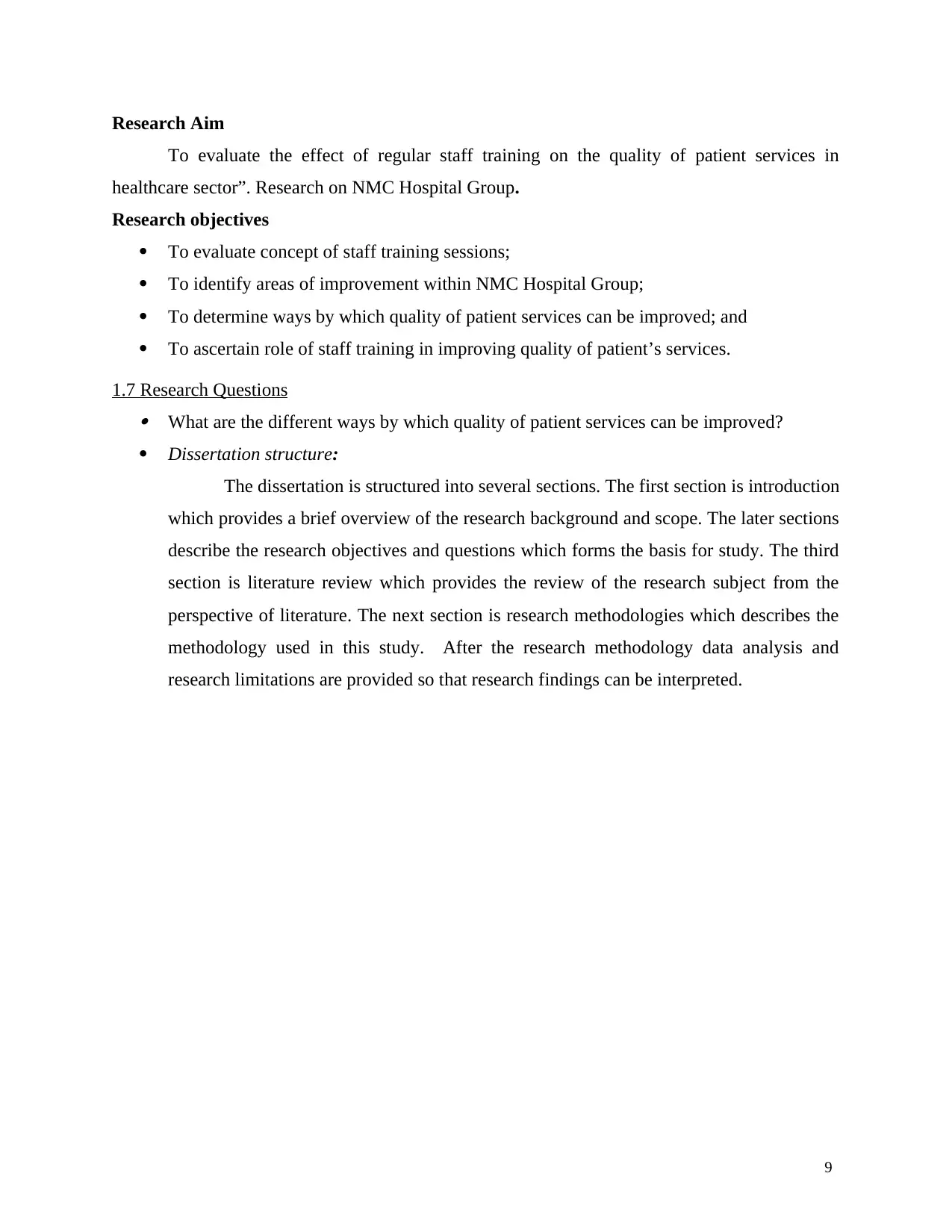
Research Aim
To evaluate the effect of regular staff training on the quality of patient services in
healthcare sector”. Research on NMC Hospital Group.
Research objectives
To evaluate concept of staff training sessions;
To identify areas of improvement within NMC Hospital Group;
To determine ways by which quality of patient services can be improved; and
To ascertain role of staff training in improving quality of patient’s services.
1.7 Research Questions What are the different ways by which quality of patient services can be improved?
Dissertation structure:
The dissertation is structured into several sections. The first section is introduction
which provides a brief overview of the research background and scope. The later sections
describe the research objectives and questions which forms the basis for study. The third
section is literature review which provides the review of the research subject from the
perspective of literature. The next section is research methodologies which describes the
methodology used in this study. After the research methodology data analysis and
research limitations are provided so that research findings can be interpreted.
9
To evaluate the effect of regular staff training on the quality of patient services in
healthcare sector”. Research on NMC Hospital Group.
Research objectives
To evaluate concept of staff training sessions;
To identify areas of improvement within NMC Hospital Group;
To determine ways by which quality of patient services can be improved; and
To ascertain role of staff training in improving quality of patient’s services.
1.7 Research Questions What are the different ways by which quality of patient services can be improved?
Dissertation structure:
The dissertation is structured into several sections. The first section is introduction
which provides a brief overview of the research background and scope. The later sections
describe the research objectives and questions which forms the basis for study. The third
section is literature review which provides the review of the research subject from the
perspective of literature. The next section is research methodologies which describes the
methodology used in this study. After the research methodology data analysis and
research limitations are provided so that research findings can be interpreted.
9
⊘ This is a preview!⊘
Do you want full access?
Subscribe today to unlock all pages.

Trusted by 1+ million students worldwide
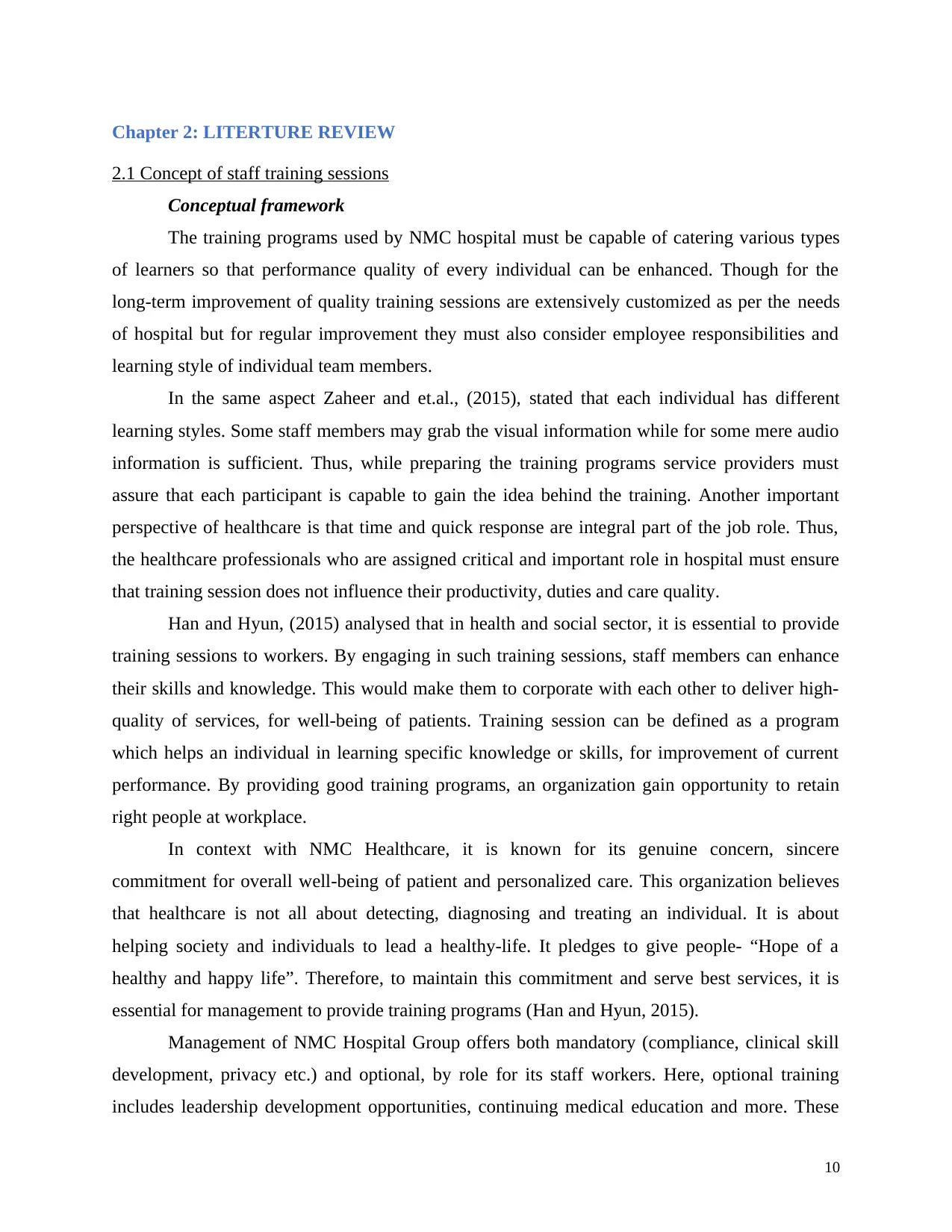
Chapter 2: LITERTURE REVIEW
2.1 Concept of staff training sessions
Conceptual framework
The training programs used by NMC hospital must be capable of catering various types
of learners so that performance quality of every individual can be enhanced. Though for the
long-term improvement of quality training sessions are extensively customized as per the needs
of hospital but for regular improvement they must also consider employee responsibilities and
learning style of individual team members.
In the same aspect Zaheer and et.al., (2015), stated that each individual has different
learning styles. Some staff members may grab the visual information while for some mere audio
information is sufficient. Thus, while preparing the training programs service providers must
assure that each participant is capable to gain the idea behind the training. Another important
perspective of healthcare is that time and quick response are integral part of the job role. Thus,
the healthcare professionals who are assigned critical and important role in hospital must ensure
that training session does not influence their productivity, duties and care quality.
Han and Hyun, (2015) analysed that in health and social sector, it is essential to provide
training sessions to workers. By engaging in such training sessions, staff members can enhance
their skills and knowledge. This would make them to corporate with each other to deliver high-
quality of services, for well-being of patients. Training session can be defined as a program
which helps an individual in learning specific knowledge or skills, for improvement of current
performance. By providing good training programs, an organization gain opportunity to retain
right people at workplace.
In context with NMC Healthcare, it is known for its genuine concern, sincere
commitment for overall well-being of patient and personalized care. This organization believes
that healthcare is not all about detecting, diagnosing and treating an individual. It is about
helping society and individuals to lead a healthy-life. It pledges to give people- “Hope of a
healthy and happy life”. Therefore, to maintain this commitment and serve best services, it is
essential for management to provide training programs (Han and Hyun, 2015).
Management of NMC Hospital Group offers both mandatory (compliance, clinical skill
development, privacy etc.) and optional, by role for its staff workers. Here, optional training
includes leadership development opportunities, continuing medical education and more. These
10
2.1 Concept of staff training sessions
Conceptual framework
The training programs used by NMC hospital must be capable of catering various types
of learners so that performance quality of every individual can be enhanced. Though for the
long-term improvement of quality training sessions are extensively customized as per the needs
of hospital but for regular improvement they must also consider employee responsibilities and
learning style of individual team members.
In the same aspect Zaheer and et.al., (2015), stated that each individual has different
learning styles. Some staff members may grab the visual information while for some mere audio
information is sufficient. Thus, while preparing the training programs service providers must
assure that each participant is capable to gain the idea behind the training. Another important
perspective of healthcare is that time and quick response are integral part of the job role. Thus,
the healthcare professionals who are assigned critical and important role in hospital must ensure
that training session does not influence their productivity, duties and care quality.
Han and Hyun, (2015) analysed that in health and social sector, it is essential to provide
training sessions to workers. By engaging in such training sessions, staff members can enhance
their skills and knowledge. This would make them to corporate with each other to deliver high-
quality of services, for well-being of patients. Training session can be defined as a program
which helps an individual in learning specific knowledge or skills, for improvement of current
performance. By providing good training programs, an organization gain opportunity to retain
right people at workplace.
In context with NMC Healthcare, it is known for its genuine concern, sincere
commitment for overall well-being of patient and personalized care. This organization believes
that healthcare is not all about detecting, diagnosing and treating an individual. It is about
helping society and individuals to lead a healthy-life. It pledges to give people- “Hope of a
healthy and happy life”. Therefore, to maintain this commitment and serve best services, it is
essential for management to provide training programs (Han and Hyun, 2015).
Management of NMC Hospital Group offers both mandatory (compliance, clinical skill
development, privacy etc.) and optional, by role for its staff workers. Here, optional training
includes leadership development opportunities, continuing medical education and more. These
10
Paraphrase This Document
Need a fresh take? Get an instant paraphrase of this document with our AI Paraphraser
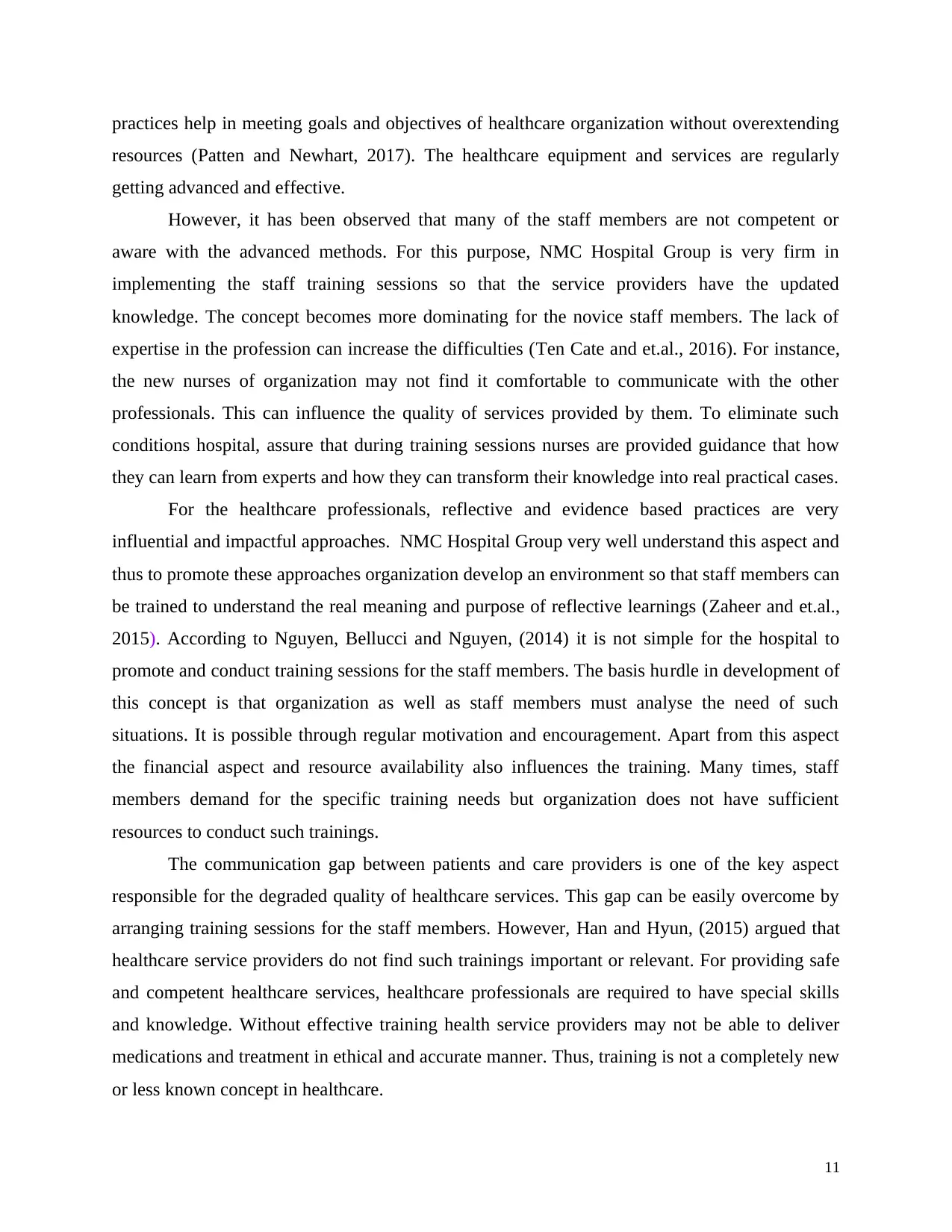
practices help in meeting goals and objectives of healthcare organization without overextending
resources (Patten and Newhart, 2017). The healthcare equipment and services are regularly
getting advanced and effective.
However, it has been observed that many of the staff members are not competent or
aware with the advanced methods. For this purpose, NMC Hospital Group is very firm in
implementing the staff training sessions so that the service providers have the updated
knowledge. The concept becomes more dominating for the novice staff members. The lack of
expertise in the profession can increase the difficulties (Ten Cate and et.al., 2016). For instance,
the new nurses of organization may not find it comfortable to communicate with the other
professionals. This can influence the quality of services provided by them. To eliminate such
conditions hospital, assure that during training sessions nurses are provided guidance that how
they can learn from experts and how they can transform their knowledge into real practical cases.
For the healthcare professionals, reflective and evidence based practices are very
influential and impactful approaches. NMC Hospital Group very well understand this aspect and
thus to promote these approaches organization develop an environment so that staff members can
be trained to understand the real meaning and purpose of reflective learnings (Zaheer and et.al.,
2015). According to Nguyen, Bellucci and Nguyen, (2014) it is not simple for the hospital to
promote and conduct training sessions for the staff members. The basis hurdle in development of
this concept is that organization as well as staff members must analyse the need of such
situations. It is possible through regular motivation and encouragement. Apart from this aspect
the financial aspect and resource availability also influences the training. Many times, staff
members demand for the specific training needs but organization does not have sufficient
resources to conduct such trainings.
The communication gap between patients and care providers is one of the key aspect
responsible for the degraded quality of healthcare services. This gap can be easily overcome by
arranging training sessions for the staff members. However, Han and Hyun, (2015) argued that
healthcare service providers do not find such trainings important or relevant. For providing safe
and competent healthcare services, healthcare professionals are required to have special skills
and knowledge. Without effective training health service providers may not be able to deliver
medications and treatment in ethical and accurate manner. Thus, training is not a completely new
or less known concept in healthcare.
11
resources (Patten and Newhart, 2017). The healthcare equipment and services are regularly
getting advanced and effective.
However, it has been observed that many of the staff members are not competent or
aware with the advanced methods. For this purpose, NMC Hospital Group is very firm in
implementing the staff training sessions so that the service providers have the updated
knowledge. The concept becomes more dominating for the novice staff members. The lack of
expertise in the profession can increase the difficulties (Ten Cate and et.al., 2016). For instance,
the new nurses of organization may not find it comfortable to communicate with the other
professionals. This can influence the quality of services provided by them. To eliminate such
conditions hospital, assure that during training sessions nurses are provided guidance that how
they can learn from experts and how they can transform their knowledge into real practical cases.
For the healthcare professionals, reflective and evidence based practices are very
influential and impactful approaches. NMC Hospital Group very well understand this aspect and
thus to promote these approaches organization develop an environment so that staff members can
be trained to understand the real meaning and purpose of reflective learnings (Zaheer and et.al.,
2015). According to Nguyen, Bellucci and Nguyen, (2014) it is not simple for the hospital to
promote and conduct training sessions for the staff members. The basis hurdle in development of
this concept is that organization as well as staff members must analyse the need of such
situations. It is possible through regular motivation and encouragement. Apart from this aspect
the financial aspect and resource availability also influences the training. Many times, staff
members demand for the specific training needs but organization does not have sufficient
resources to conduct such trainings.
The communication gap between patients and care providers is one of the key aspect
responsible for the degraded quality of healthcare services. This gap can be easily overcome by
arranging training sessions for the staff members. However, Han and Hyun, (2015) argued that
healthcare service providers do not find such trainings important or relevant. For providing safe
and competent healthcare services, healthcare professionals are required to have special skills
and knowledge. Without effective training health service providers may not be able to deliver
medications and treatment in ethical and accurate manner. Thus, training is not a completely new
or less known concept in healthcare.
11
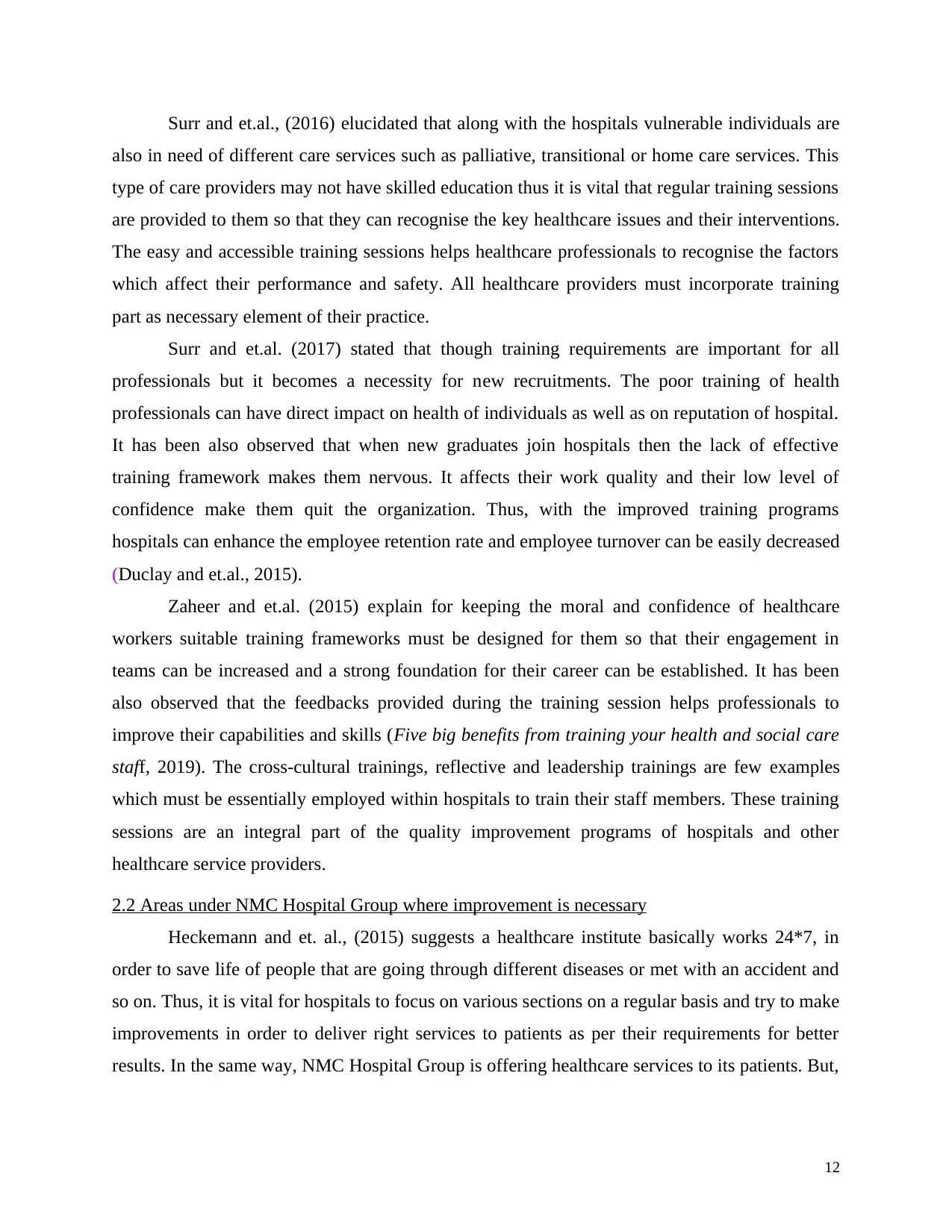
Surr and et.al., (2016) elucidated that along with the hospitals vulnerable individuals are
also in need of different care services such as palliative, transitional or home care services. This
type of care providers may not have skilled education thus it is vital that regular training sessions
are provided to them so that they can recognise the key healthcare issues and their interventions.
The easy and accessible training sessions helps healthcare professionals to recognise the factors
which affect their performance and safety. All healthcare providers must incorporate training
part as necessary element of their practice.
Surr and et.al. (2017) stated that though training requirements are important for all
professionals but it becomes a necessity for new recruitments. The poor training of health
professionals can have direct impact on health of individuals as well as on reputation of hospital.
It has been also observed that when new graduates join hospitals then the lack of effective
training framework makes them nervous. It affects their work quality and their low level of
confidence make them quit the organization. Thus, with the improved training programs
hospitals can enhance the employee retention rate and employee turnover can be easily decreased
(Duclay and et.al., 2015).
Zaheer and et.al. (2015) explain for keeping the moral and confidence of healthcare
workers suitable training frameworks must be designed for them so that their engagement in
teams can be increased and a strong foundation for their career can be established. It has been
also observed that the feedbacks provided during the training session helps professionals to
improve their capabilities and skills (Five big benefits from training your health and social care
staff, 2019). The cross-cultural trainings, reflective and leadership trainings are few examples
which must be essentially employed within hospitals to train their staff members. These training
sessions are an integral part of the quality improvement programs of hospitals and other
healthcare service providers.
2.2 Areas under NMC Hospital Group where improvement is necessary
Heckemann and et. al., (2015) suggests a healthcare institute basically works 24*7, in
order to save life of people that are going through different diseases or met with an accident and
so on. Thus, it is vital for hospitals to focus on various sections on a regular basis and try to make
improvements in order to deliver right services to patients as per their requirements for better
results. In the same way, NMC Hospital Group is offering healthcare services to its patients. But,
12
also in need of different care services such as palliative, transitional or home care services. This
type of care providers may not have skilled education thus it is vital that regular training sessions
are provided to them so that they can recognise the key healthcare issues and their interventions.
The easy and accessible training sessions helps healthcare professionals to recognise the factors
which affect their performance and safety. All healthcare providers must incorporate training
part as necessary element of their practice.
Surr and et.al. (2017) stated that though training requirements are important for all
professionals but it becomes a necessity for new recruitments. The poor training of health
professionals can have direct impact on health of individuals as well as on reputation of hospital.
It has been also observed that when new graduates join hospitals then the lack of effective
training framework makes them nervous. It affects their work quality and their low level of
confidence make them quit the organization. Thus, with the improved training programs
hospitals can enhance the employee retention rate and employee turnover can be easily decreased
(Duclay and et.al., 2015).
Zaheer and et.al. (2015) explain for keeping the moral and confidence of healthcare
workers suitable training frameworks must be designed for them so that their engagement in
teams can be increased and a strong foundation for their career can be established. It has been
also observed that the feedbacks provided during the training session helps professionals to
improve their capabilities and skills (Five big benefits from training your health and social care
staff, 2019). The cross-cultural trainings, reflective and leadership trainings are few examples
which must be essentially employed within hospitals to train their staff members. These training
sessions are an integral part of the quality improvement programs of hospitals and other
healthcare service providers.
2.2 Areas under NMC Hospital Group where improvement is necessary
Heckemann and et. al., (2015) suggests a healthcare institute basically works 24*7, in
order to save life of people that are going through different diseases or met with an accident and
so on. Thus, it is vital for hospitals to focus on various sections on a regular basis and try to make
improvements in order to deliver right services to patients as per their requirements for better
results. In the same way, NMC Hospital Group is offering healthcare services to its patients. But,
12
⊘ This is a preview!⊘
Do you want full access?
Subscribe today to unlock all pages.

Trusted by 1+ million students worldwide
1 out of 60
Related Documents
Your All-in-One AI-Powered Toolkit for Academic Success.
+13062052269
info@desklib.com
Available 24*7 on WhatsApp / Email
![[object Object]](/_next/static/media/star-bottom.7253800d.svg)
Unlock your academic potential
Copyright © 2020–2026 A2Z Services. All Rights Reserved. Developed and managed by ZUCOL.





